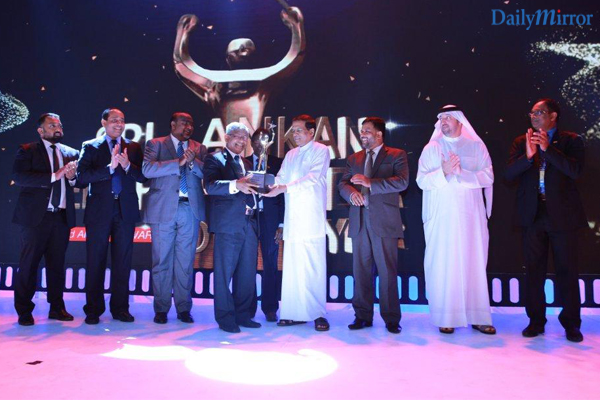Reply To:
Name - Reply Comment
Last Updated : 2024-04-20 00:00:00

Mr. Kulathunga Rajapakse is no stranger to Sri Lanka’s industry and entrepreneur circles. As Managing Director of the DSI Samson Group, the country’s premier business conglomerate and leading manufacturer of footwear and bicycle tyres in Sri Lanka, he overlooks 32 companies while occupying patron level positions in National organizations for industries. His invaluable contribution in shaping Sri Lanka’s industry economy and leadership in addressing key issues on behalf of entrepreneurs gained recognition recently at the 22nd Sri Lankan Entrepreneur of the Year Awards organized by the Federation of Chambers of Commerce and Industry of Sri Lanka (FCCISL). Mr. Kulathunga Rajapakse was awarded the lifetime ‘Hall of Fame’ award by His Excellency, President Maithripala Sirisena.
Following the reception of the prestigious award, this impressive industrialist shares his thoughts about the business he built with his family and the industrial landscape of the island.
When asked what it meant to win the ‘Hall of Fame’ award, Mr. Rajapakse stated that the award stood as a statement to his contribution to the industry and thanked the FCCISL for choosing him as its recipient.
Describing the beginnings of the DSI Samson Group, the Managing Director explained, “From our very inception and throughout the development of DSI, we have continuously transformed challenges into opportunities and taken risks by venturing into territories others have not considered. These two features have been our keys to success. Our first factory was established in 1962 to overcome the restrictions posed by the Government on imports. As a result of a suffering Foreign Exchange situation, the importing of finished products were highly restricted, whereas importing raw material and machinery were encouraged in order to set up industries with the aim of developing the local economy. We took on this challenge and ventured into manufacturing, and set up our first factory in my father’s hometown, Galle.”

The company’s growth was threatened in 1977 by the introduction of the Open Economy, which led to an increase in the importation of finished footwear and a decline in market prices. The local footwear industry suffered immensely. However, customers soon realized that the cheap imports were not durable and reverted to locally manufactured footwear. DSI’s school shoes were one such product, which could not be rivaled.
“Nonetheless, this challenge led us to re-look at our own products, the productivity of our manufacturing lines by increasing the TAT, as well as our designs, since we had to compete with foreign products. It was actually a blessing in disguise because we improved significantly during this time”, said Mr. Rajapakse.
In 1980, a new brand – Ranpa – was born as a result of the political threat faced by the network within the electorate and the Business Acquisition Act. Mr. Rajapakse explained how the company considered moving out of the electorate and founded a new footwear manufacturing plant in Colombo, under a different name and a new Board of Directors.
This threat resulted in the DSI Samson Group enjoying a higher import quota and a substantial share of the market as both factories were manufacturing the same product. The organization also launched their very own ultra-modern Design Department, to tackle increasing competition. With the investment in its own retail outlets the company acquired first-hand feedback on the movement of their designs, which were extremely important for production. Thus, the DSI Samson Group’s retail network was expanded across the island.
According to Mr. Rajapakse, DSI’s entrance into the export market was yet another initiative in response to a challenge the organization faced. While the Ministry of Industry was encouraging exports at the time, the main obstacle was the Arab-Israel conflict. The Arab countries were limiting their imports to countries that were not suppliers to Israel. In 1970 the DSI Samson Group received their first export consignment to Saudi Arabia. Following this period the BOI in Katunayake was launched. This was a challenge for DSI, as foreign buyers did not want to travel to the network’s factory in Galle. Taking this threat into consideration DSI opened its factory in Kalutara, purely for exports. This factory is to date the most efficient and productive of its kind, as it was well-planned and built with state-of-the-art facilities.
“Strategically we practice umbrella branding through our corporate brand, DSI. This enables us to defend the market segment. Individual and sub branding is used for our diversified products. Our CSR brand remains ‘Samson’, in honour of our founder and Chairman, my father, the late Mr. D. Samson Rajapakse. We also have international brands such as Fila, Clarks, Puma, Reebok, Raleigh, Jac, Garware, Vardhaman, Next and Migrow, from all industries. These enhance our brand portfolio”, replied Mr. Rajapakse to a query about DSI’s maintenance of its consolidated brand image.
When asked about his responsibilities as a member of several national level organizations and their importance to the growth of the industry, the Managing Director explained that DSI has been a member of the Sri Lanka Chamber of Small and Medium Industries, the National Chamber of Commerce of Sri Lanka and subsequently the National Chamber of Exporters of Sri Lanka, ensuring the company’s membership as the business grew.
Mr. Rajapakse himself has represented the various sectors; footwear, rubber and others, in the Chambers. “It is crucial that entrepreneurs and companies join these national bodies in order to collectively address issues pertaining to the industry. They also serve as knowledge and experience sharing platforms, which is beneficial to the new entrants.”
The veteran businessman believes that Sri Lanka has enormous potential but is not interested in creating a conducive environment for entrepreneurs. He explained that the present banking system, though one of the most developed in the region, still prefers financing the trading sector to industries. The loan portfolios serve a very low percentage for agriculture and manufacturing. It is paramount that we introduce a two-tier interest rate, which will benefit both categories. The SMEs are discouraged in the form of limitations when applying for loans. Currently there is much interest in FTAs. However, Sri Lanka as a country has not been able to reap the benefits of these agreements until now. Bilateral arrangements would be more favorable for our economy. Mr. Rajapakse also emphasized the importance of protecting the local market. An industry has to be stable within the local market before it ventures to exports. For example, the brassware industry is still a cottage industry and is in a very primitive stage. The state has to invest and develop such industries
The Managing Director of the DSI Samson Group was adamant in his belief in the importance of the presence of start-ups for the development of the country’s economy. “Start-ups and advocating of entrepreneurship from the initial stage are very important to the industry economy of any nation. New entrants face many challenges, as there are no venture capital agreements or rebates provided by the government. The development of technology has to go hand-in-hand with this, since we are in a world that is governed by ICT. It is the responsibility of the state and existing industries to help the start-ups by identifying bottlenecks and funding feasible solutions. At DSI we regularly invite undergraduates to visit our factories and report back on their observations. There is always something to learn when a fresh pair of eyes evaluates it. The key characteristics of a successful entrepreneur are risk taking, embracing innovation and a mindset that is ready to evolve. These features need to be actively reinforced in order to build a strong industrial economy, which in turn will be favorable to the nation as a whole.”

Add comment
Comments will be edited (grammar, spelling and slang) and authorized at the discretion of Daily Mirror online. The website also has the right not to publish selected comments.
Reply To:
Name - Reply Comment
On March 26, a couple arriving from Thailand was arrested with 88 live animal
According to villagers from Naula-Moragolla out of 105 families 80 can afford
Is the situation in Sri Lanka so grim that locals harbour hope that they coul
A recent post on social media revealed that three purple-faced langurs near t